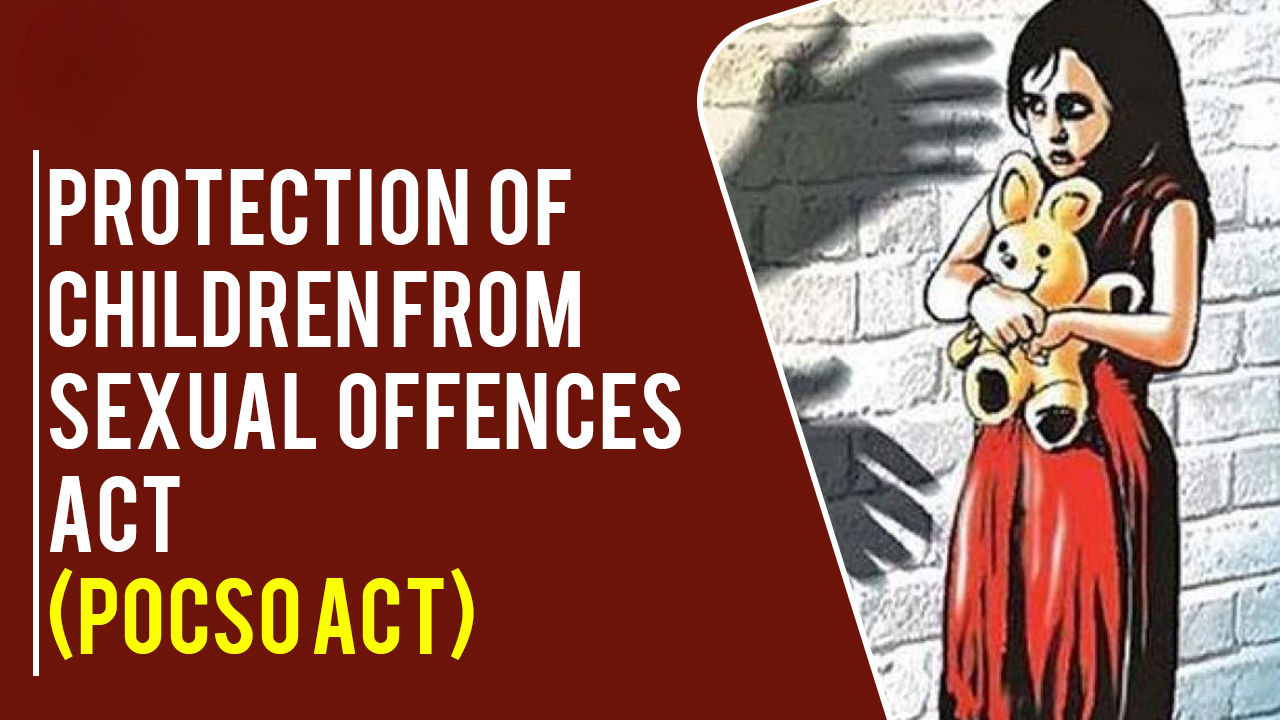POSCO ACT
📅 Last updated: July 16, 2025 2 min read
 Why in News?
Why in News?
- In May 2025, the Supreme Court of India delivered a rare and sensitive judgment in a POCSO case involving a 14-year-old girl and a 25-year-old man from rural West Bengal.
- Though the man was convicted for aggravated sexual assault under the POCSO Act, the court, considering the girl’s prolonged relationship, emotional trauma, and the birth of a child, used its power under Article 142 to avoid sentencing the man.
- This sparked national debate on whether the POCSO Act, in its current rigid form, is equipped to handle consensual adolescent relationships.
 Why in News?
Why in News?
- In May 2025, the Supreme Court of India delivered a rare and sensitive judgment in a POCSO case involving a 14-year-old girl and a 25-year-old man from rural West Bengal.
- Though the man was convicted for aggravated sexual assault under the POCSO Act, the court, considering the girl’s prolonged relationship, emotional trauma, and the birth of a child, used its power under Article 142 to avoid sentencing the man.
- This sparked national debate on whether the POCSO Act, in its current rigid form, is equipped to handle consensual adolescent relationships.

What is the POCSO Act?
- Introduced in 2012, the Protection of Children from Sexual Offences (POCSO) Act was enacted following India’s commitment to the UN Convention on the Rights of the Child.
- The Act defines a child as anyone under the age of 18 and criminalizes sexual assault, harassment, and pornography involving minors.
- The 2019 amendment made the law stricter by introducing death penalty provisions for heinous crimes against children to deter offenders.
- In 2020, the Government introduced new POCSO Rules that focused on compensation, support services, and timely relief for victims.
Key Features of the Act
- Gender-Neutral Language: The Act applies equally to boys and girls, ensuring non-discriminatory justice in cases of sexual abuse.
- Mandatory Reporting: Any adult who fails to report abuse can be prosecuted, pushing schools, neighbors, and guardians to act responsibly.
- Explicit Terminologies: Terms like ‘sexual assault’ and ‘child pornography’ are clearly defined, making legal interpretation easier for police and courts.
- Burden of Proof: Courts must presume the accused guilty once the child’s statement is proven unless the accused rebuts it, offering strong protection to minors.
POCSO Rules, 2020
- Rule 9 - Interim Compensation: Special courts can award monetary aid for rehabilitation and healthcare immediately after FIR registration.
- Immediate Relief: CWCs can recommend urgent financial help for food, clothes, shelter within 7 days using local welfare funds.
- Support Person: CWCs must appoint a trained person to help the child during police inquiry and court trial, ensuring emotional and legal support.
- Privacy and Confidentiality: Identity of the child victim must be protected throughout the legal process to avoid social stigmatization.
📉 Real-Life Data: Conviction vs. Reality
- Data from 7,064 POCSO cases revealed that over 24.3% involved romantic relationships, not criminal predation.
- In these cases, more than 82% of minor girls refused to testify against the accused, hinting at mutual involvement or emotional complexity.
- Conviction rates remain low not due to leniency but because victims often resist being labeled as victims.
- This shows a disconnect between the rigid structure of law and the dynamic social context of adolescent relationships.
⚖️ Misuse and Over-Criminalization of Adolescents
- Families sometimes misuse POCSO to settle personal disputes or caste-based disapproval of consensual adolescent relationships.
- A 18-year-old boy can be charged with rape for dating a 16-year-old girl, even without any element of coercion or complaint.
- This contradicts practices in many countries where adolescents above 16 can consent with age-gap protections.
- Blanket criminalization fosters fear, ruins young lives, and clogs the judicial system with complex cases that need nuance, not punishment.
🧒 Support Beyond Courtroom: Life After Judgment
- Victims often face social stigma, family abandonment, or poverty after the trial, especially if they have a child born from the incident.
- There is no long-term state support for victims in terms of housing, livelihood, trauma counseling, or skill-building.
- In the West Bengal case, the girl was left alone to raise her child, take care of an ill mother-in-law, and survive under social pressure.
- Child Welfare Committees must be empowered and resourced to provide long-term rehabilitation plans, not just legal help.
Way Forward
- Close-in-Age Exemption: Legal reform is needed to prevent criminalizing teenage love. A 2–3 year age-gap buffer can provide justice without overreach.
- Special POCSO Courts should be established in every district to fast-track cases and protect children from re-victimization.
- Government must fund training, infrastructure, and forensic labs to ensure timely investigation and avoid unnecessary delays.
- Comprehensive sexuality education in schools can help adolescents understand consent, boundaries, and legality.
Conclusion
The POCSO Act has served as a powerful legal shield to protect children. But as society evolves, so must our laws. Every case involving a child should be met not only with the force of law but with compassion, context, and care. The goal must not be blind punishment but ensuring that no child or adolescent suffers twice—first at the hands of an individual, and then by the system meant to protect them.
What is the POCSO Act?
- Introduced in 2012, the Protection of Children from Sexual Offences (POCSO) Act was enacted following India’s commitment to the UN Convention on the Rights of the Child.
- The Act defines a child as anyone under the age of 18 and criminalizes sexual assault, harassment, and pornography involving minors.
- The 2019 amendment made the law stricter by introducing death penalty provisions for heinous crimes against children to deter offenders.
- In 2020, the Government introduced new POCSO Rules that focused on compensation, support services, and timely relief for victims.
Key Features of the Act
- Gender-Neutral Language: The Act applies equally to boys and girls, ensuring non-discriminatory justice in cases of sexual abuse.
- Mandatory Reporting: Any adult who fails to report abuse can be prosecuted, pushing schools, neighbors, and guardians to act responsibly.
- Explicit Terminologies: Terms like ‘sexual assault’ and ‘child pornography’ are clearly defined, making legal interpretation easier for police and courts.
- Burden of Proof: Courts must presume the accused guilty once the child’s statement is proven unless the accused rebuts it, offering strong protection to minors.
POCSO Rules, 2020
- Rule 9 - Interim Compensation: Special courts can award monetary aid for rehabilitation and healthcare immediately after FIR registration.
- Immediate Relief: CWCs can recommend urgent financial help for food, clothes, shelter within 7 days using local welfare funds.
- Support Person: CWCs must appoint a trained person to help the child during police inquiry and court trial, ensuring emotional and legal support.
- Privacy and Confidentiality: Identity of the child victim must be protected throughout the legal process to avoid social stigmatization.
📉 Real-Life Data: Conviction vs. Reality
- Data from 7,064 POCSO cases revealed that over 24.3% involved romantic relationships, not criminal predation.
- In these cases, more than 82% of minor girls refused to testify against the accused, hinting at mutual involvement or emotional complexity.
- Conviction rates remain low not due to leniency but because victims often resist being labeled as victims.
- This shows a disconnect between the rigid structure of law and the dynamic social context of adolescent relationships.
⚖️ Misuse and Over-Criminalization of Adolescents
- Families sometimes misuse POCSO to settle personal disputes or caste-based disapproval of consensual adolescent relationships.
- A 18-year-old boy can be charged with rape for dating a 16-year-old girl, even without any element of coercion or complaint.
- This contradicts practices in many countries where adolescents above 16 can consent with age-gap protections.
- Blanket criminalization fosters fear, ruins young lives, and clogs the judicial system with complex cases that need nuance, not punishment.
🧒 Support Beyond Courtroom: Life After Judgment
- Victims often face social stigma, family abandonment, or poverty after the trial, especially if they have a child born from the incident.
- There is no long-term state support for victims in terms of housing, livelihood, trauma counseling, or skill-building.
- In the West Bengal case, the girl was left alone to raise her child, take care of an ill mother-in-law, and survive under social pressure.
- Child Welfare Committees must be empowered and resourced to provide long-term rehabilitation plans, not just legal help.
Way Forward
- Close-in-Age Exemption: Legal reform is needed to prevent criminalizing teenage love. A 2–3 year age-gap buffer can provide justice without overreach.
- Special POCSO Courts should be established in every district to fast-track cases and protect children from re-victimization.
- Government must fund training, infrastructure, and forensic labs to ensure timely investigation and avoid unnecessary delays.
- Comprehensive sexuality education in schools can help adolescents understand consent, boundaries, and legality.
Conclusion
The POCSO Act has served as a powerful legal shield to protect children. But as society evolves, so must our laws. Every case involving a child should be met not only with the force of law but with compassion, context, and care. The goal must not be blind punishment but ensuring that no child or adolescent suffers twice—first at the hands of an individual, and then by the system meant to protect them.
Learning often happens in classrooms but
it doesn’t have to.
Contact us : +91 78380 91015 (Whatsapp)
92112 65654 (For Call)
mail to : HeMantraofficialhelp@gmail.com


